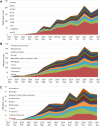Profiling COVID-19 Genetic Research: A Data-Driven Study Utilizing Intelligent Bibliometrics
- PMID: 34109284
- PMCID: PMC8184093
- DOI: 10.3389/frma.2021.683212
Profiling COVID-19 Genetic Research: A Data-Driven Study Utilizing Intelligent Bibliometrics
Abstract
The COVID-19 pandemic constitutes an ongoing worldwide threat to human society and has caused massive impacts on global public health, the economy and the political landscape. The key to gaining control of the disease lies in understanding the genetics of SARS-CoV-2 and the disease spectrum that follows infection. This study leverages traditional and intelligent bibliometric methods to conduct a multi-dimensional analysis on 5,632 COVID-19 genetic research papers, revealing that 1) the key players include research institutions from the United States, China, Britain and Canada; 2) research topics predominantly focus on virus infection mechanisms, virus testing, gene expression related to the immune reactions and patient clinical manifestation; 3) studies originated from the comparison of SARS-CoV-2 to previous human coronaviruses, following which research directions diverge into the analysis of virus molecular structure and genetics, the human immune response, vaccine development and gene expression related to immune responses; and 4) genes that are frequently highlighted include ACE2, IL6, TMPRSS2, and TNF. Emerging genes to the COVID-19 consist of FURIN, CXCL10, OAS1, OAS2, OAS3, and ISG15. This study demonstrates that our suite of novel bibliometric tools could help biomedical researchers follow this rapidly growing field and provide substantial evidence for policymakers' decision-making on science policy and public health administration.
Keywords: COVID-19; bibliometrics; genetic research; knowledge discovery; network analytics.
Copyright © 2021 Wu, Zhang, Grosser, Tipper, Venter, Lin and Lu.
Conflict of interest statement
HL, MG, ST, DV are employees of Strands Pty Ltd. The remaining authors declare that the research was conducted in the absence of any commercial or financial relationships that could be construed as a potential conflict of interest.
Figures








References
-
- Bastian M., Heymann S., Jacomy M. (2009 March). Gephi: An open-source software for exploring and manipulating networks. In Proceedings of the International AAAI Conference on Web and Social Media, 3 (1).
-
- Callon M., Courtial J.-P., Turner W. A., Bauin S. (1983). From Translations to Problematic Networks: An Introduction to Co-word Analysis. Soc. Sci. Inf. 22 (2), 191–235. 10.1177/053901883022002003 - DOI
LinkOut - more resources
Full Text Sources
Miscellaneous

